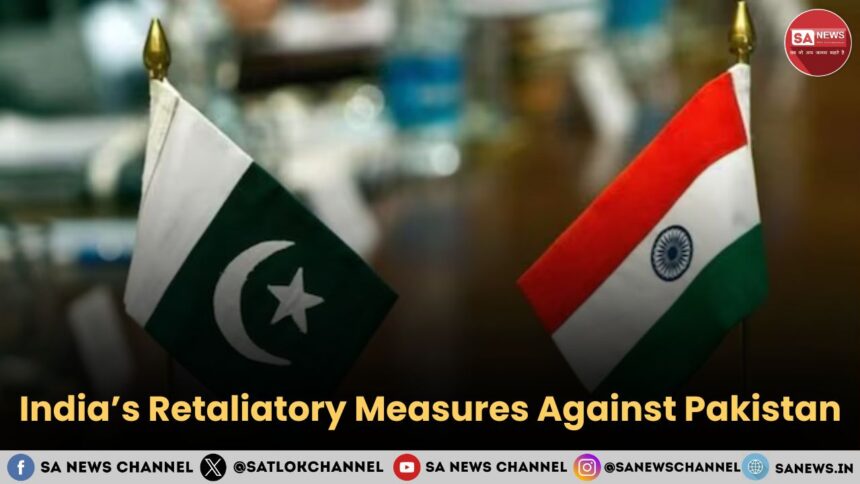In the aftermath of the brutal Pahalgam terror attack, India has responded with a firm and strategic approach. The government, led by the Ministry of External Affairs and the Ministry of Defence, has taken a series of tough actions aimed at sending a clear message to Pakistan: terrorism will not go unpunished. This incident marks a significant shift in India’s security policy and diplomatic stance in the region.
- Pahalgam Terror Attack: A Turning Point in Security Policy
- Key Actions Taken: Trade Ban, Diplomatic Downgrade & More
- 1. Suspension of Bilateral Trade
- 2. Diplomatic Downgrade
- 3. Indus Waters Treaty Review
- 4. Crackdown on Terror Funding
- 5. Global Diplomacy Push
- Impact on Regional Stability & Future Indo-Pak Relations
- Conclusion
Pahalgam Terror Attack: A Turning Point in Security Policy
The Pahalgam terror attack, which resulted in the death of several Indian soldiers and civilians, has shaken the nation. The attack was reportedly carried out by Pakistan-based terror groups, once again raising serious concerns about cross-border terrorism. It has been widely condemned not only in India but also by several international partners, including the United States, France, and Japan.
Unlike in the past, the Indian government has adopted an immediate and decisive response. The focus has shifted from reactive measures to proactive, punitive steps that aim to isolate Pakistan on multiple fronts—economic, diplomatic, and geopolitical.
Key Actions Taken: Trade Ban, Diplomatic Downgrade & More
1. Suspension of Bilateral Trade
India has officially suspended all trade relations with Pakistan, including the movement of goods through the Line of Control (LoC). This step aims to financially choke terror networks believed to be operating with the support of Pakistani authorities. The suspension affects both legal and informal trade routes.
2. Diplomatic Downgrade
The Indian government has downgraded diplomatic ties with Pakistan. High Commissioners have been recalled, and diplomatic engagements have been significantly reduced. This signals a major shift in India-Pakistan relations and aims to pressure Islamabad diplomatically on the international stage.
3. Indus Waters Treaty Review
India is now reviewing the Indus Waters Treaty, which was brokered by the World Bank in 1960. If India decides to withdraw or limit the treaty’s scope, it would affect the flow of rivers into Pakistan—a move that would have significant consequences for its agriculture and water supply. This is being viewed as a peaceful but powerful pressure tactic.
4. Crackdown on Terror Funding
Domestically, India has increased its efforts to cut off funding to terror groups. Agencies such as the NIA and ED are investigating suspected networks and have frozen multiple accounts linked to illegal funding from across the border.
5. Global Diplomacy Push
India is reaching out to major powers and international organizations to designate Pakistan-based terror groups as global threats. The government is also working to blacklist more entities through the Financial Action Task Force (FATF), where Pakistan remains on the “grey list.”
Impact on Regional Stability & Future Indo-Pak Relations
The Indian response has undoubtedly heightened tensions in the region. However, many analysts believe this is a necessary recalibration of policy in order to ensure long-term peace and security. It’s no longer just about warnings or strong statements—it’s about taking real, measurable action.
Shift in Indo-Pacific Strategy
The Indo-Pacific security framework is also impacted. With India strengthening defence ties with countries like the U.S., Japan, and Australia through forums like QUAD, the message is clear—India is aligning with nations that prioritize peace, democracy, and a strong stance against terrorism.
Pakistan’s Response
As expected, Pakistan has denied any involvement in the Pahalgam attack and criticized India’s actions as “aggressive.” However, the international community has shown increasing support for India’s position, especially after repeated cross-border attacks in recent years.
Conclusion
The Pahalgam terror attack has become more than just another tragedy—it has become a defining moment in India’s national security policy. Through a series of bold actions like the trade ban, diplomatic downgrade, and the potential Indus Waters Treaty suspension, India is signaling that it will no longer tolerate terror in any form.
This new approach not only strengthens India-Pakistan relations in a different light but also plays a critical role in shaping the regional security narrative in South Asia and the broader Indo-Pacific region.
India is no longer merely responding to terror—it is reshaping its future strategy with strength, clarity, and purpose.









